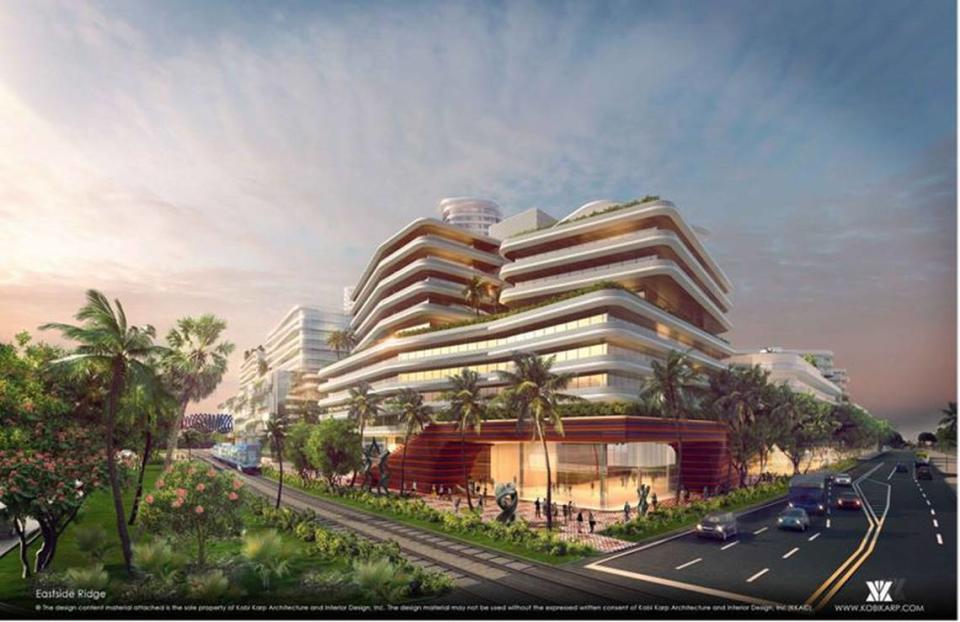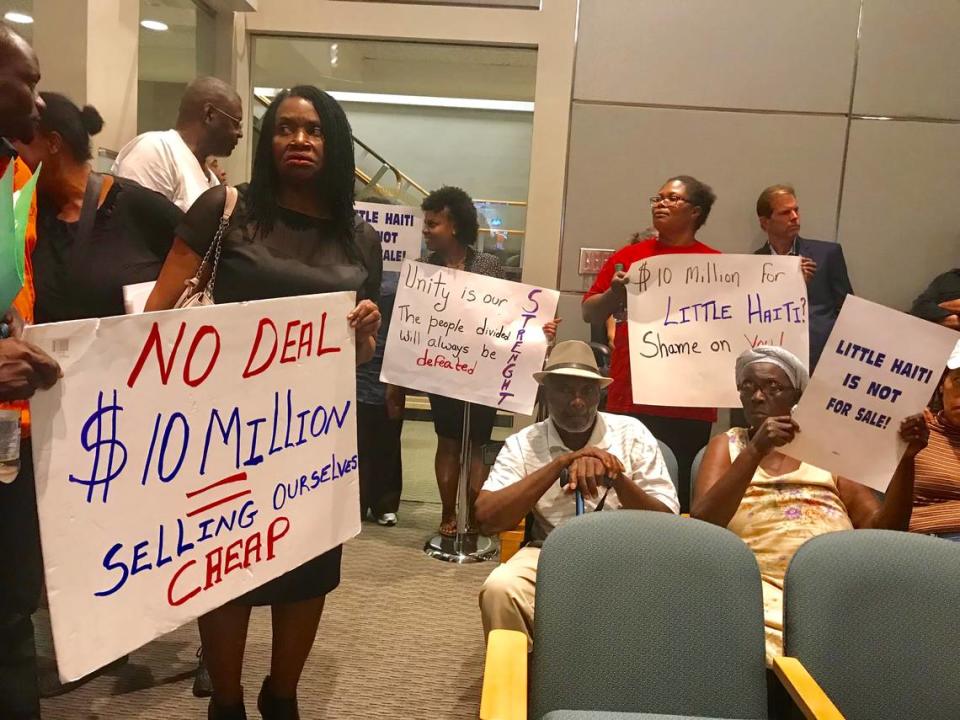Massive Little Haiti redevelopment plan denied for the sixth time
For the sixth time, Miami’s planning board stymied a massive and massively controversial plan that would raze more than 22 acres of apartments on the edge of Little Haiti and replace them with a dense cluster of mixed-use towers.
After more than two hours of an often-contentious hearing Wednesday night at Miami City Hall, a 6-1 majority of the city’s Planning, Zoning and Appeals Board deferred an application for land-use changes for the Eastside Ridge Special Area Plan by SPV Realty LLC, the owners of Design Place, a complex of around 500 apartments from the 1940s on the west side of Northeast Second Avenue at 54th Street.
In November, after the fifth vote by the board to delay a decision, SPV sued the city to force the panel’s members to make an up-or-down decision on zoning changes the developers need for their redevelopment plan. SPV argues that the planning board has deliberately stalled the project for more than three years. The suit is pending.
The board makes recommendations to the City Commission, which makes the ultimate decision. But a rezoning proposal can’t reach the commission until the planning board votes either for or against it. The board deadlocked once on the zoning changes in a 5-5 vote, and has deferred voting on the rezoning as well as on related land-use changes SPV is seeking on other occasions.
Had the board held a yes-or-no vote on Thursday, it would have made SPV’s lawsuit moot. But the legal standoff and the uncertainty over the proposed project’s fate remained unresolved as board members and the property owner’s attorney remained at sharp odds over how to proceed.
The board, citing the potential impact of the Eastside Ridge plan on surrounding neighborhoods and on the city’s shortage of affordable housing, has repeatedly asked SPV to conduct more outreach meetings with residents. Board members have also asked SPV to update a four-year-old traffic study that members say is seriously outdated. SPV has failed to do either. The board routinely makes rezoning approvals contingent on such conditions, and developers typically comply.
On Thursday, however, SPV’s attorney, Vicky Leiva, flatly refused after board members again raised the requests.
Leiva, a partner at Bilzin Sumberg, argued that further outreach meetings would be pointless because residents can’t agree on what changes to the project blueprint they want from SPV. She also relied on the city’s chief of urban design, David Snow, who told the board that the traffic study remains valid even though it was prepared in 2016, before city commissioners approved the equally massive Magic City Innovation District Special Area Plan on a site just a few blocks to the north of the Eastside Ridge property.
Board members, who have complained in other hearings about what they describe as foot-dragging and bad faith by SPV, did not take Leiva’s refusal well.
One member, Aaron Zeigler, called it “astounding.” Other members said they believe Leiva’s strategy is an effort to get the rezoning past the planning board to the commission, where the developers are confident of winning approval in spite of broad community objections, which range beyond Little Haiti to resurgent neighborhoods to the east and south of the proposed redevelopment.

Another, Juvenal Piña, suggested SPV is simply looking to increase the value of its property through rezoning before selling it, and has “no intention” of building anything.
Board member Andres Althabe cited the pending suit by SPV, but noted the court has issued no orders requiring a vote. He proposed another deferral in an effort to get the owners to comply with the board’s requests.
“There is no acceptable traffic study. I cannot accept that they keep ignoring the [residents],” Althabe said. “The applicant is more interested in a vote than to really improve this application.”
The lone “no” vote, board chair Charles Garavaglia, argued that further deferrals would prove fruitless since Leiva has made it clear the developers will not budge.
Some members also cited a bold stance taken by the board in December, when an 8-1 majority voted to draft a resolution urging the City Commission to repeal the section of the 10-year-old Miami 21 zoning code that allows such special area plans.
The SAPs, as they’re known, give developers and city planners wide latitude to increase density and modify zoning requirements for properties of at least nine acres in exchange for public benefits such as parks and community programs. But some, including Magic City and Eastside Ridge, have proven hugely controversial because of their location in the middle of low-scale neighborhoods like Little Haiti. Critics contend they lead to projects that are grossly out of scale with surrounding communities and that accelerate gentrification of low-income neighborhoods by displacing residents and businesses.

The subject of Thursday’s hearings was a set of proposed land-use changes SPV principals are seeking that would change the classification of their property from medium density multi-family to restricted commercial. Those land-use changes must be made before the land can be rezoned for the special area plan.
But because of confusion in a previous hearing in May of last year, the board voted on the rezoning — a tie 5-5 vote that constitutes no recommendation — but never voted on those required land-use changes.
Still, some planning board members on Thursday questioned why they would even be considering the requested land-use modifications given their objection to special area plans.
Several activists and residents who have dogged the proposal since its inception spoke in support of deferral before the vote. One, veteran Little Haiti activist Marleine Bastien, said SPV had made no changes to its plan or a related proposal for “community benefits” that include a promise of a $10 million contribution to a Little Haiti fund since the last time Leiva came before the board in October.
“You stated yourselves that this was the worst community benefits package you had ever seen,” Bastien told the board, referring to criticism of the developer’s proposal by some members. “Nothing has changed since then. The project was bad then. It is bad now.”
Offered a chance by Garavaglia to rebut the testimony by Bastien and others, as is routine in quasi-judicial public hearings, Leiva declined.

